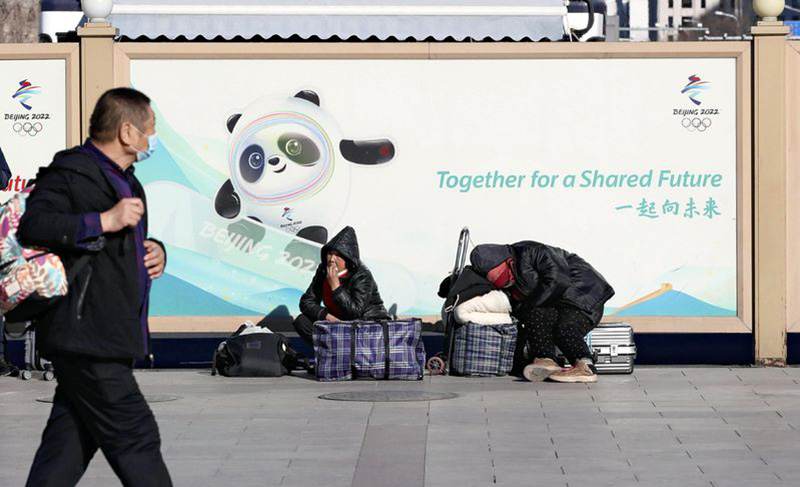
People sit in front of a banner promoting the Beijing Winter Olympics at Beijing Station as they wait for the train to their hometown on Jan. 17.
10:45 JST, February 1, 2022
“The goal of ‘getting 300 million people involved in winter sports’ has become a reality,” said Li Sen, director general of the General Planning Department of the 2022 Beijing organizing committee, during a Jan. 13 press conference in Beijing.
The “300 million people” goal was a pledge Chinese President Xi Jinping made during Beijing’s bid to host the 2022 Winter Games, which it won in 2015.
Xi, as secretary general of the Chinese Communist Party, is the nation’s supreme leader, so his words carry absolute weight in China.
In the years since Xi made the pledge, the entire nation has been making efforts to popularize winter sports.
If you build it, they will come
Late last year in central Beijing, members of a Peking University curling club were giving advice to one another at an indoor curling rink.
The club members practiced crouching low and sliding curling stones.
“I first came upon this sport 2½ years ago and became fascinated by it,” a 24-year-old member said. “The top attraction for me is that it depends on teamwork.”
The curling rink is one such winter sports facility among many built across China after Beijing won the bid to host the Winter Games.
According to Chinese media, between 2015 and early 2021 the number of ski resorts in the country increased from about 500 to 803, while ice skating rinks increased from about 200 to 654.
In January 2018 an indoor ski facility opened in Shanghai operated by Snow51, which is based in the city. After that first location, the company has increased the number of indoor ski facilities it runs to 25 across China as of January this year.
“We have also bulldozed our way toward the goal set by General Secretary Xi,” said Ye Kai, the 49-year-old founder of the company. “The Olympics will bring a new ski boom to China. A revolutionary change may occur in the global ski market.”
Urban-rural divide
At the same time, the achievement of Xi’s ambitious goal has clearly shown the serious problem of the economic gaps in Chinese society.
Li of the Beijing Organizing Committee for the 2022 Olympic and Paralympic Winter Games said that “346 million people now participate in winter sports,” showing the goal had been achieved.
In actuality, the number appears to be an accumulated total of people who have experienced winter sports at least once, regardless of whether they continue to participate.
Of the number, 78% are residents of urban areas and the remaining 22% are residents of agricultural areas, where income levels are low.
For farmers who cannot afford to buy gear, winter sports and the Winter Olympics are distant prospects.
At Beijing Station on Jan. 25, a 52-year-old migrant worker in the construction industry waited for a train to his home in Hebei Province to spend the Lunar New Year holidays.
“The Olympics? Not interested,” he said brusquely. “My concern is when I can receive my unpaid salary.”
His monthly income is about 2,500 yuan (about ¥45,100). The amount is barely enough to buy a pair of boots from Chinese snowboard brand Cold Mountain, which is popular among young people in China.
Not like 2008
For the 2008 Beijing Summer Olympics, the five official mascots symbolized the people of China’s enthusiasm and excitement about the country hosting the Games for the first time. Combining the names of the five mascots formed a sentence in Chinese for “Welcome to Beijing.” A remarkable number of people walked in public with dolls of the mascots in their hands.
This time, such scenes are rarely seen. Amid the rich-poor divide and the novel coronavirus pandemic, many people in China are skeptical.
“I’m not in the mood to celebrate the Olympics,” said a restaurant worker in Beijing.
A Chinese newspaper reporter has monitored ways of living of low-income people in urban areas who search for usable items in garbage disposal sites and bring the items home.
“From the point of view that the festivities can cause the entire population to feel pride and have dreams, these Games are far from being a ‘success,’” said the reporter.
The Beijing Winter Olympics motto is “Together for a Shared Future” — a beautiful slogan that many people in China might hear as empty words.
Top Articles in Politics
-

Japan PM Takaichi’s Cabinet Resigns en Masse
-

Sanae Takaichi Elected Prime Minister of Japan; Keeps All Cabinet Appointees from Previous Term
-

Japan’s Govt to Submit Road Map for Growth Strategy in March, PM Takaichi to Announce in Upcoming Policy Speech
-

LDP Wins Historic Landslide Victory
-

LDP Wins Landslide Victory, Secures Single-party Majority; Ruling Coalition with JIP Poised to Secure Over 300 seats (UPDATE 1)
JN ACCESS RANKING
-

Japan PM Takaichi’s Cabinet Resigns en Masse
-

Japan Institute to Use Domestic Commercial Optical Lattice Clock to Set Japan Standard Time
-

Israeli Ambassador to Japan Speaks about Japan’s Role in the Reconstruction of Gaza
-

Man Infected with Measles Reportedly Dined at Restaurant in Tokyo Station
-

Videos Plagiarized, Reposted with False Subtitles Claiming ‘Ryukyu Belongs to China’; Anti-China False Information Also Posted in Japan























